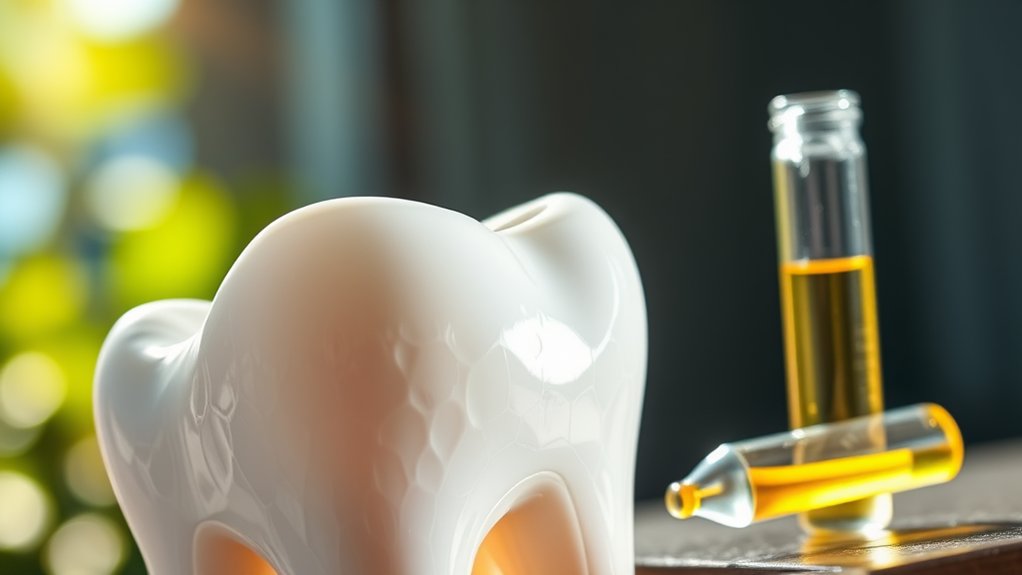The Impact of Vitamin D on Tooth Strength
You might not realize how crucial vitamin D is for your dental health. This nutrient not only enhances calcium absorption but also plays a pivotal role in tooth enamel strength. When vitamin D levels drop, the consequences can be significant, leading to weakened teeth and a higher risk of decay. Understanding this connection can change how you view your dental care. What specific mechanisms are at play, and how can you ensure you’re getting enough vitamin D?
The Role of Vitamin D in Calcium Absorption
When you consider the importance of calcium for strong teeth, you can’t overlook the critical role that vitamin D plays in calcium absorption.
Vitamin D enhances calcium’s bioavailability, allowing your body to effectively utilize this essential mineral. Without sufficient vitamin D, your ability to absorb calcium from dietary sources diminishes, leading to weaker teeth and increased susceptibility to dental issues.
Research indicates that adequate vitamin D levels correlate with improved dental health, emphasizing the vital connection between vitamin D and teeth strength. Additionally, vitamin D boosts your immune system to combat harmful bacteria that can threaten dental integrity.
Prioritizing vitamin D can ensure optimal calcium absorption, ultimately supporting your oral health and overall well-being.
How Vitamin D Affects Bone Mineralization
Although many factors influence bone health, vitamin D stands out as a crucial element in the process of bone mineralization.
It facilitates the absorption of calcium and phosphate, essential minerals for developing and maintaining strong bones. Without adequate vitamin D, your body struggles to absorb these minerals efficiently, leading to insufficient bone mineral density.
Research shows that vitamin D receptors in bone cells stimulate processes that promote mineralization. Thus, if you’re looking to support your skeletal health, ensuring optimal vitamin D levels is vital.
This connection underscores the importance of monitoring and maintaining adequate vitamin D for effective bone mineralization.
The Connection Between Vitamin D and Oral Health
Vitamin D’s role extends beyond just supporting bone mineralization; it also plays a significant part in maintaining oral health. Studies indicate that vitamin D can reduce the risk of periodontal disease and tooth decay, enhancing the body’s ability to fight off infections.
Here’s a quick comparison illustrating its effects:
| Effect | Vitamin D |
|---|---|
| Reduces Gum Inflammation | Yes |
| Aids Calcium Absorption | Yes |
| Strengthens Tooth Enamel | Yes |
| Decreases Tooth Decay Risk | Yes |
Incorporating sufficient vitamin D can significantly improve your overall oral health, ensuring stronger teeth and gums. Additionally, a lack of Vitamin D increases the risk of tooth decay and gum disease, which can adversely affect overall health.
Sources of Vitamin D for Optimal Dental Strength
Ensuring you get enough vitamin D is crucial not just for overall health, but specifically for bolstering dental strength. The primary sources include sunlight exposure, which helps your body synthesize vitamin D naturally.
Additionally, dietary sources play a vital role; fatty fish like salmon and mackerel are rich in vitamin D, while fortified foods, such as milk and cereals, can enhance your intake.
Supplements are also an effective option, particularly during seasons with limited sunlight. By incorporating these sources into your routine, you can significantly improve your vitamin D levels, which in turn supports optimal tooth strength and overall oral health.
Consequences of Vitamin D Deficiency on Tooth Integrity
A lack of vitamin D can lead to significant ramifications for tooth integrity. When you’re deficient in this vital nutrient, your dental health may suffer due to several factors:
- Increased risk of tooth decay
- Weakening of tooth enamel
- Higher likelihood of periodontal disease
- Impaired calcium absorption, leading to fragile bones
These consequences show how crucial vitamin D is for maintaining strong, healthy teeth.
Without adequate levels, not only does your tooth structure weaken, but your overall oral hygiene can decline. It’s essential to monitor your vitamin D intake to ensure your teeth remain robust and resilient against decay and disease.




